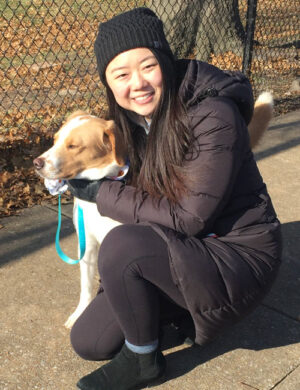Momoko Oyama, a Washington University graduate on the verge of beginning her third year of medical school at the university, died Sunday, June 14, 2020, at her campus apartment in St. Louis. The cause of death is not yet known. Oyama, who had planned to become a neonatologist, was 24.
“Momo was kind, smart and generous with her time,” said Lisa Moscoso, MD, PhD, professor of pediatrics and associate dean for student affairs at the School of Medicine. “She really found meaning and joy in her work with children, and her playful laughter and quiet patience were traits we love to see in pediatrics. Her loss is devastating to her family, her class and the many other people who loved her — and it’s also a great loss to the young patients and families she would have helped as a physician. She genuinely delighted in children and would have been an amazing addition to the field of pediatrics.”
Oyama was born in Fukuoko, Japan, and moved to the United States when she was age 3. Growing up in St. Louis, she attended Japanese school on Saturdays and was fluent in Japanese. She decided to attend Washington University, where she graduated in 2014 with a bachelor’s degree in anthropology and a minor in biology.
While an undergrad, she participated in the Institute for Public Health’s Summer Research Program, which she credited with sparking her interest in public health. The experience gave her the opportunity to work in the lab of childhood malnutrition expert Mark J. Manary, MD, the Helene B. Roberson Professor of Pediatrics. Her work on a project in Manary’s lab led to the publication of a paper she co-authored in The Journal of Nutrition.
She then went on to study abroad in Durban, South Africa, where she lived with a family while shadowing health-care providers at a hospital, rural clinics and community health centers. The opportunity resulted in her senior honors thesis, which focused on Zulu traditions during pregnancy and birth.
Her path to medical school was dotted with experiences that fostered her interest in pediatrics and neonatology. Among them, she served as a guide for families participating in the university’s Wolfram Syndrome Research Clinic; a coordinator for a group that organized play groups for St. Louis-area children adopted from China; an instructor in infant CPR classes for families of patients at St. Louis Children’s Hospital; and a “cuddler” in the NICU at St. Louis Children’s, holding and providing comfort to premature infants.
Oyama also was a research assistant in Washington University’s Neonatal Developmental Research Lab and in the Department of Obstetrics & Gynecology. Last summer, she worked with Hayley Friedman, MD, an assistant professor in the Department of Pediatrics, to evaluate a comprehensive care program for pregnant women with opioid use disorder and their infants. Most recently, she joined a volunteer effort led by the school’s medical students to help respond to the coronavirus pandemic; she was quick to sign up to help health-care workers in need of child care.

Oyama is survived by her mother, Reiko Oyama, director of nuclear pharmacy at the university’s Mallinckrodt Institute of Radiology; her father, Nobuyuki Oyama; her sister, Sakura Oyama (Oliver McMillan); and her beloved dog, Kuma.
A funeral service was held Thursday, June 18, in St. Louis. Plans are being made for a memorial service that friends can more easily attend in the fall.
In lieu of flowers, memorial contributions may be made to the Animal Protective Association (APA) Adoption Center of Missouri; 1705 S. Hanley Road; St. Louis, MO 63144.
With the loss of Oyama, as well as ongoing national racial strife and the coronavirus pandemic, university leaders want to stress that mental health support is available for students on the Medical and Danforth Campuses. Students on the Medical Campus may contact Student Health Services at 314-362-3523 or the Student Assistance Program at 1(800) 327-2255, 24 hours a day, seven days a week. After hours, Karen Winters, MD, is also available via [email protected].
Students on the Danforth Campus may call 314-935-6695 at the Habif Health and Wellness Center, or email [email protected].
Source: Read Full Article
